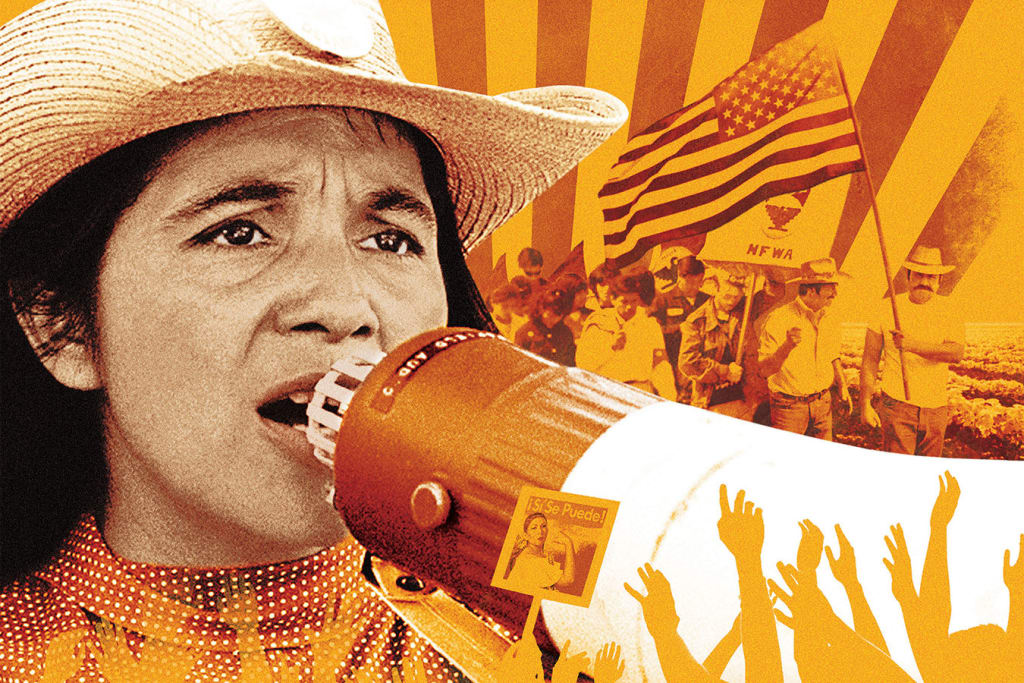The Best Film Nobody Is Talking About
A civil rights icon gets her own movie, and is still overlooked.

On March 14, 2014 the film Cesar Chavez was released into theaters. It told the story of the legendary farm-worker and civil rights leader Cesar Chavez during the 1960s and 1970s. On paper it seemed like a film critics would praise and audiences, particularly Latino audiences, would embrace. It had a great cast that featured Michael Pena as Chavez, America Ferrera as his wife Helen Chavez and Rosario Dawson as civil rights leader Dolores Huerta. It was a film co-produced by Participant Media, a production company with the mission statement of producing films with a story that revolves around social and civic change. Despite all of this, it was a film that came and went with almost no real buzz surrounding it, and no significant word of mouth to propel it. The film was panned by critics and made very little noise at the box office. I must admit, as excited I was to see that a film like this was being made, it took about two weeks after its initial release for me to actually see the film. When I saw it, I was disappointed. I was still happy that the story of arguably the most important civil rights leader in Latino-American history was made into a feature length film, but more importantly, I was saddened to see that the film itself didn’t live up to the standards that it should have. It was also disappointing to see a film like this not reach any kind of critical or fan success, because had it been successful it would have opened the door to so many other stories like it. People so easily forget that Latinos, specifically Mexican-Americans have been living in the United States for centuries. We didn’t start to suddenly immigrate here over the last twenty years, and we definitely are not guilty of doing the things that Fox News and the Trump regime accuse us of doing. I say all of this because the stories of our people and of our cultures are very deep and complex. Had the film Cesar Chavez become a success, it would have been a precedent to produce future films like it, but it wasn’t, and I along with many other Latino film fans had to wonder where our next story would come from.
Three years later, I saw a film that represented everything that Cesar Chavez should have been. Enter the film Dolores. Unlike Cesar Chavez, this film is a documentary that tells the story of Dolores Huerta. In the 60s and 70s, she was right by Chavez’s side in regards to unionizing farm workers, organizing the Delano Grape Strike of 1965 and would eventually go on to be one of the most important civil rights figures not just for Latino history but for American history as a whole. Not to mention she also coined the phrase “Si Se Puede” or “Yes We Can.” That’s right, she coined the phrase that decades later was adapted by then presidential candidate Barack Obama in 2008 as one of his more memorable slogans. The film also goes on to explain her intersectional causes in regards to fighting racism, sexism, being an advocate for the L.G.B.T. community and essentially being an ally to any progressive cause since the modern day civil rights movement.
The film was co-produced by Carlos Santana and Benjamin Bratt and directed by Benjamin's brother Peter Bratt. The film has garnered a lot of praise and had won multiple film festival accolades. Despite all of the praise and all of the awards that it garnished over the last year, there’s one question that remains: why aren’t more people talking about this film?
For many years, Latino-Americans made up the largest percentage of film goers. They had this distinction until 2016 when they were narrowly beaten out by Asian-Americans. There is clearly a market for films such as Dolores to succeed in a wider audience, yet many studios are still not convinced that this type of film about this type of person can turn a profit. PBS was the distributor of the film, and although they do great work, a film as culturally significant as this one should have larger film studios in a bidding war for it. A film like this shouldn’t be overlooked, and considering how many awards it has already won, you would think that it would be impossible to overlook it. Granted most documentaries no matter the quality don’t get the kind of attention they deserve, and unless you’re Michael Moore you’re probably not going to get very much publicity or attention leading up to the release of the film. Nevertheless, I can honestly say that this is probably the most underrated film of 2017, and it’s very disappointing to see it go so unnoticed considering the documentary renaissance that occurred just last year.
At last year's Academy Awards the documentary category garnered a lot of attention. Out of the five films that were nominated, four of the films featured a black director and three of them focused specifically on subjects that revolve around the African-American experience. The three films were:
- O.J: Made In America, director Ezra Edelman’s story of how O.J Simpson became one of the countries most beloved athletes to one of the countries most hated figures after allegedly killing two people
- I Am Not Your Negro, director Raoul Peck’s story adapted from the unfinished writing of the James Baldwin manuscript Not This House, where Baldwin discusses his personal feeling of how and why civil rights leaders Medgar Evers, Malcom X and Martin Luther King Jr had all been assassinated
- And last but certainly not least was 13th, Ava DuVernay’s story of how the loophole of the 13th amendment of the U.S Constitution has led to today’s mass incarceration which has led us to our modern day prison industrial complex.
These films were very notable and very significant because they were nominated in the Oscars that had finally responded to the previous two years of the #OscarsSoWhite trend, so to have three out of the five films in the documentary category to revolve around very black centric stories that resonated very well and very positively with a large audience. This was definitely a sign that the academy was adapting from its old ways, and was slowly but surely evolving into the 21st century. With this precedent of quality films and award nominations, this would naturally open the door for other stories to be equally praised and equally lauded.
At this years Oscars, Dolores was not nominated. When I saw the film's name absent from the others I was disappointed. I understand that there are plenty of great films, particularly great documentaries that are never fully embraced or rewarded as they should be, but nevertheless I felt like this was a film that despite telling the story of a woman who became an icon fifty years ago, reveals the importance and the relevancy of today's struggle more than ever. Some could argue that it didn’t have the campaigning from a big enough studio to support it, or that P.B.S was too unorthodox of a distributor in the world of feature length films. But that didn’t seem to bother the three films from last year. Edelman’s films was distributed from E.S.P.N. Sure they’ve invested money in the 30 for 30 documentary series in recent years, but their prime goal is to report and discuss the news in the world of sports. Peck’s film was distributed by Magnolia Pictures and Amazon. Granted one of them is a more traditional independent film distributor, but the other still has the prime goal of being an online shopping website that’s selling you, well, virtually everything. DuVernay’s film was distributed by Netflix, an entertainment platform which ironically has done more to convince people to never leave their homes, more specifically their couches, than actually go out to a theatre. All of the distributors I mentioned were all either very small or at the least very untraditional. Dolores checks of all of these boxes, and yet it didn’t receive an Oscar nomination.
Despite Dolores not getting the kind of accolade that it deserves, its influence, either directly or indirectly, has already been seen. Late in 2017 Disney-Pixar created the film Coco, a story that revolves around a family that celebrates the cultures and traditions of Dia De Los Muertos. Since it’s release back on Thanksgiving weekend, it’s grossed over six hundred million dollars. In December Fox Searchlights produced The Shape Of Water, which delves into the love story of a mute woman and a sea creature from another world. Despite the film not having any Latino actors in the film, what’s equally as important on the subject of representation is that the film was written, produced, and directed by Mexican filmmaker Guillermo Del Toro. At this year's Oscars, it garnered thirteen nominations including best director for Del Toro and best picture of the year. No film that year has more nominations.
I correlate these films with Dolores because it proves two things. First it proves that films that are specifically centered around a particular culture can reach a mass audience, not solely with the audience that it represents, but for people from all walks of life who if exposed to it, can learn something new and, in doing so, will make them a lot smarter, a lot more cultured, and a lot more open minded to the people that the film represents. Lastly it proves that as important as representation, and specifically seeing someone who looks like you in front of the camera is, what’s also crucial is that the same kind of representation that is depicted behind the camera as well. So when people begin to read the opening/closing credits of a film they can see names that are reminiscent of their own and it will give them the ability to open their minds to a world of possibility, and one day think, that one day, those names can be their own.
About the Creator
Carlos Navarrette
Carlos Navarrette is a writer who loves cheese almost as much as he loves Star Wars.





Comments
There are no comments for this story
Be the first to respond and start the conversation.